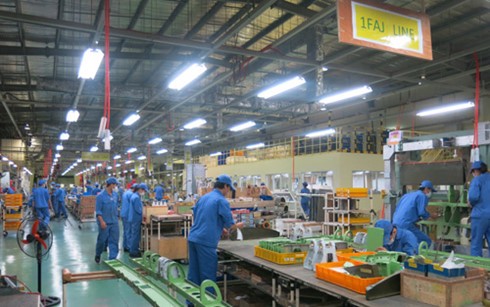(VOVworld) – 2016 is being observed as the National Year for Startups. This year the issue of startups is attracting the attention of the entire society. Vietnamese enterprises have strongly developed and made important contributions to national economic successes. The government’s target of having one million businesses by 2020 is not easy to attain but it is something for Vietnam to strive for.
 |
| To have successful startup companies, first of all they should understand their strong points. (Photo: VOV) |
Nguyen Trong Thien, Deputy President of the Small and Medium-Sized Enterprise Association of Hanoi, said startup entrepreneurs often meet difficulties in the initial periods of starting a company due to the gap between academic knowledge and practical application.
In addition, they still lack practical experience in business management, marketing, communications, and production.
Thien said building a successful startup requires state support with capital and administrative procedures:
“The State should further step up administrative reforms because there remain many obstacles for the current licensing. It’s also necessary to facilitate better conditions so that startups can access capital. We should provide support with capital once an individual or a household business has a feasible project. They should be guaranteed for borrowing capital, which is a prerequisite for startups. Without money, they will not purchase equipment, technology, or workshops, and can’t hire workers. A startup company should be facilitated in getting access to capital, particularly preferential capital resources. In that way, they can also call for foreign investment.”
 Tran Nguyen Le Van, CEO of Vexere, meaning “cheap coach tickets”, said one of the main reasons so many companies were created was that there were so many things to do. (Photo: vir.com.vn)
Tran Nguyen Le Van, CEO of Vexere, meaning “cheap coach tickets”, said one of the main reasons so many companies were created was that there were so many things to do. (Photo: vir.com.vn)
Most startup businesses usually have to struggle with financial resources, the personnel’s shortage of professional skills, and weak adaptation to integration. Thus they can get easily confused with administrative procedures and legal issues.
Do Hoai Nam, co-founder of the Co-Working Space, an information supplier for startup companies, said:
“A startup business often faces numerous difficulties, mainly with office expenses and non-human costs accounting for up to half of the company’s spending. This factor makes Vietnamese startups less competitive. Besides, they have few opportunities to exchange knowledge with major economic groups.”
Pham Thi Thu Hang, Secretary General of the Vietnam Chamber of Commerce and Industry, said recently the government has made great efforts to create a more favorable business environment and promulgate policies to support individuals in starting up businesses and growing them after the startup period, with a focus on developing the scale of production.
Hang said the Vietnamese government has a policy of helping entrepreneurs both when they begin startups and after that, and of paying attention to the links among startups and between startups and investors, allowing them to grow as much as possible.
According to Hang, “We have a plan placing top priority on working with business associations and provincial people’s committees to design programs to support enterprises in each locality and then across the country. Second, we’ll improve the capacity for business associations and conduct research on business costs, compare them with those in other countries around the world, and propose the next steps the government should take to continue supporting startups.”
Vietnam has a generation of startup businesses full of zing and high determination to realize their passion. But to be successful, on top of business knowledge, understanding of market and business management models, and personal will, startups need a professional and healthy startup environment.